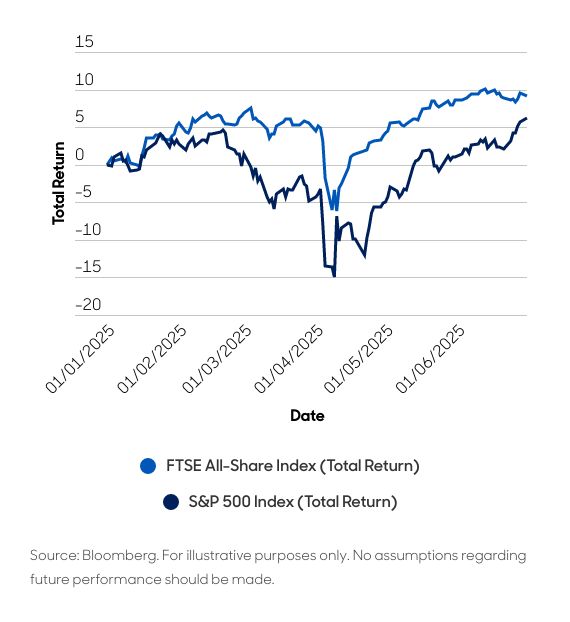Higher-yield UK stocks are outperforming as US sentiment wavers – is this just the beginning?
As US market sentiment weakens, high-yield UK stocks are quietly leading the charge. With small-caps gaining traction and dividends driving returns, could this be the start of a new era for UK investors?
8th August 2025 09:08
by Thomas Moore from Aberdeen

Key highlights
- UK equities have outperformed US equities in the first half of 2025, led by higher-yield stocks
- For many years, investor allocations to US equities have grown at the expense of UK equities
- Even a small rotation out of the US and into the UK could make a meaningful difference to returns
- Within UK equities, we observe that smaller-cap stocks could be starting a resurgence, making this a rich hunting ground for investors who can invest across the UK market.
The resurgence in UK equities could come as quite a surprise for investors who have grown used to the dominance of US growth companies over the past decade. In the first six months of 2025, the FTSE All-Share index has delivered a total return of +9.1%, significantly outperforming the S&P 500 index delivered +6.2% in local currency terms. What’s even more surprising is that higher-yield stocks have been leading the UK market (Source: Bloomberg, 16 July 2025).
Our analysis shows that high dividend yield stocks have led the UK equity market over the first six months of the year, outperforming lower-yield stocks and proving that dividends and capital growth can go hand in hand. Splitting the market into five equally weighted baskets, ranging from the highest-yielding stocks to the lowest-yielding stocks, a clear pattern emerges. The two-highest yielding baskets, with an average yield of 5.9%, have generated a total return of +15.2%. In contrast, the three lower-yielding baskets, with an average yield of 2.1%, have only managed to generate an average total return of +5.4% (Source: Aberdeen, Bloomberg, 1 July 2025).
FTSE All Share vs S&P 500

Wavering sentiment towards US assets can be seen across a range of asset classes. The DXY index, which measures the performance of the US dollar against a basket of other currencies, is down 10.7% in the first six months of 2025, breaking a long run of dollar appreciation. Within the US equity market, the flagship ‘Magnificent Seven’ technology companies are seeing their status questioned, removing one of the key pillars of support.
Meanwhile, US bond markets are also experiencing significant volatility on concerns over unsustainable pro-cyclical fiscal policies. Most recently, the “One Big, Beautiful Bill” is creating a fiscal firestorm in the US, given concerns that it could add between $3 trillion and $5 trillion to the national debt over the next decade. In addition, investors are concerned by unpredictable policy making, in particular tariff policies, as well as institutional decay. All this sits uneasily with the high valuations and heavy allocations to US equities.
The US has attracted a huge amount of investment from overseas investors in the past two decades. The US Bureau of Economic Analysis states that foreign ownership of US assets totals $62 trillion, far higher than the $36 trillion of overseas assets held by US owners. This makes the US the largest net debtor country in the world. To put these numbers into perspective, the FTSE All-Share (over 500 companies) totals $3.5 trillion.
Another way of contextualising it is to consider that the market capitalisation of Apple, at $3.1 trillion (as at 16 July 2025), is approximately the same as the whole UK market. What is clear is that it would not require a large shift out of US assets into the UK equity market for there to be a pronounced impact on share prices. UK stocks are cheap after years of weakness caused by macro concerns, but all the while, UK companies have been diligently taking action to improve their efficiency and grow their profits.
So, it’s against this backdrop that we believe that the current rotation out of US equities could have legs. Human beings tend to wait to see a trend develop before they start to feel the urgency to act on it. Investors have grown used to the US market delivering reliable, outsized returns. The weakness of the US dollar also changes the calculation for non-US investors, exerting a further drag on returns. The trepidation starting to be felt by investors who are overly concentrated in US assets could become a catalyst for action.
There is also a strong case for increased diversification, particularly as some passive portfolios may have as much as 70% in the US. In the past, diversification meant selling UK equities to buy overseas equities, but investor allocations to UK equities have slumped over the past decade. As the reliability of US growth stocks fades, international and domestic investors could turn their attention to the UK.
The follow-on question for investors is what asset class they should consider rotating into. The strong performance of UK equities in the first half of 2025 might represent early evidence of a shift into UK equities. In a slow-growth world, every country has its fair share of challenges, but we see some emerging positives for the UK including the government’s intention to make economic growth its number one priority, investing in infrastructure and defence, reforming planning controls and pushing through de-regulation of the financial services sector.
Within the UK equity market, we observe some interesting shifts going on beneath the surface:
First, income stocks are now doing all the running, with higher-yield stocks outperforming lower-yield stocks. High-yield stocks have a natural appeal at a time of uncertainty. Rather than relying on unpredictable capital growth, investors can enjoy greater visibility of returns if they find stocks that offer dividend yields in excess of 6%, plus buybacks on top. The UK market has an abundance of companies that fulfil this brief.
Second, we are now seeing a shift in performance by size of company. Large-cap stocks were first out of the blocks, as so often happens in early stages of a turnaround. Yet something interesting happened in April 2025 – smaller-cap stocks started to outperform larger-cap stocks.
Putting all this together, we believe that this makes the UK a potentially rich hunting ground for income investors, particularly those who are willing to look all the way down the market cap spectrum. Our index-agnostic approach to income investing allows the Aberdeen Equity Income Trust to go anywhere, seeking out the best valuation opportunities across the market. This makes us poised and ready for this new era, as investors look to broaden out their allocations into small and mid-cap stocks.
Investors have always looked to the UK for dividend yield, but an improving corporate earnings backdrop can now enable dividend growth and capital growth to become a reality. This is why we see no compromise between the pursuit of income and capital.
Thomas Moore is investment manager at abrdn Equity Income Trust.
ii is an Aberdeen business.
Aberdeen is a global investment company that helps customers plan, save and invest for their future.
These articles are provided for information purposes only. Occasionally, an opinion about whether to buy or sell a specific investment may be provided by third parties. The content is not intended to be a personal recommendation to buy or sell any financial instrument or product, or to adopt any investment strategy as it is not provided based on an assessment of your investing knowledge and experience, your financial situation or your investment objectives. The value of your investments, and the income derived from them, may go down as well as up. You may not get back all the money that you invest. The investments referred to in this article may not be suitable for all investors, and if in doubt, an investor should seek advice from a qualified investment adviser.
Full performance can be found on the company or index summary page on the interactive investor website. Simply click on the company's or index name highlighted in the article.